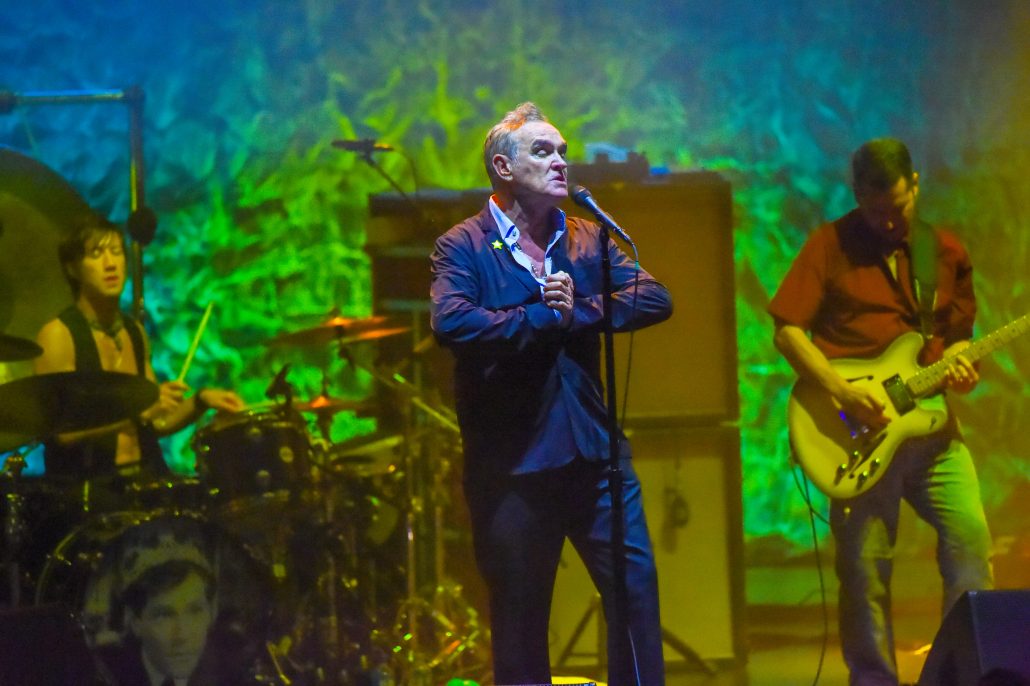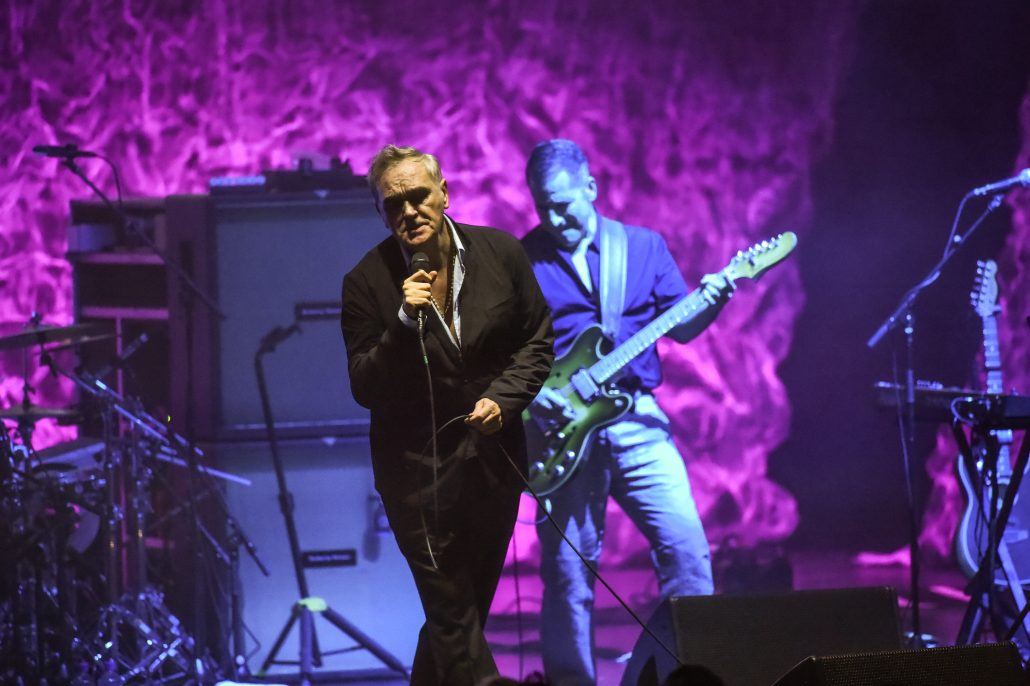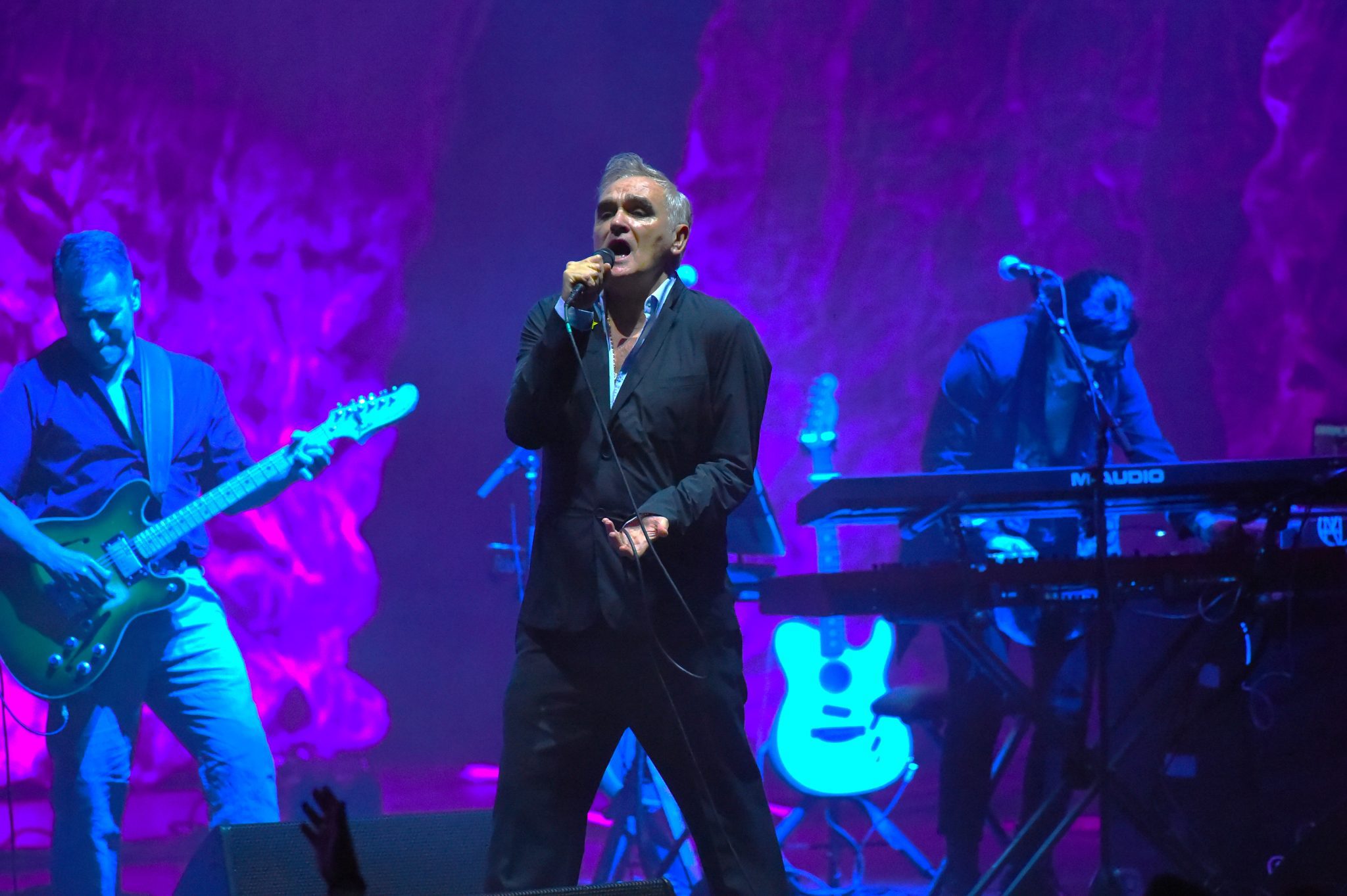For a while, I honestly thought Morrissey was punking all of us. At precisely 8:30 p.m. this past Sunday, the lights dimmed at Hard Rock Live, and it appeared as though the legendary frontman was in a punctual mood. Little did we know that it would be another 37 minutes until Moz would take the stage—a ponderous interregnum consumed by a tiresome clip show on the screen behind the stage: Iggy & the Stooges’ “Search & Destroy” paired with harrowing war images from “Apocalypse Now,” the iconic video from Sinead O’Connor’s “Nothing Compares 2 U,” a Siouxsie and the Banshees performance, a question about Morrissey on an old TV game show, and other manipulated detritus from bygone pop culture.
The preamble took so long that I began to wonder if this wasn’t so much the lead-in to the show as the show itself: an amble through Morrissey’s YouTube algorithm in lieu of the real McCoy.
But credit the transcendent power of live music performed well: When Moz did finally grace us with his presence, he was in good spirits, with his introductory statement “so this is Hollywood” registering more as an affectionate declaration than an ironic question. As soon he launched into all-time fan favorite “Suedehead” as the opening number, all was forgiven.

Ever dapper in a black button-down shirt that would gradually open during the performance, Morrissey remains the quintessential gentleman crooner of alternative rock, indebted to both the showmanship of musical theatre and to punk’s antiestablishment discontent. His onstage gesticulations were a patented paradox of shyness and flamboyance, sardonic humor and stone-faced gravity. On “How Soon is Now?”, the perennial Smiths classic that’s been a set-list staple for years, he changed one of the lyrics from “And all my hope is gone” to (I think) “much of my life has gone,” a reflection that at 64, he’s hardly the young rebel that penned that song in 1984. I’ve seen Moz play this cut many times, but it never ceases to be a highlight, complete with the rousing ceremonial gong smashes and thunderous kettle drum percussion for a coda.
Other highlights included “I Wish You Lonely,” whose roiling bass and thundering guitar came alive in a way that surpassed the recording version, and the (hopefully) forthcoming “Sure Enough, the Telephone Rings,” which Morrissey said he suggested to play on an American TV “breakfast show” in a response to a “morning-friendly” track. Needless to say, with lyrics such as “Please be fair/You must tell the kids they live in hell now,” the network didn’t take him up on the offer.

Morrissey’s first-rate band occasionally added different instrumental flavors to the set, including standup bass (and Morrissey’s maracas) on the driving rocker “The Loop,” and a more acoustic arrangement for the essential Smiths ballad “Please, Please, Please, Let Me Get What I Want,” which contained a soaring guitar solo that can only be described as majestic.
Which gets to the sense of unevenness that permeates even the best Morrissey concerts, and this one was right up there with the other three I’ve attended. The Smiths material, and that of his early solo worker, is so objectively the strongest that his newer songs can’t help but pale in comparison. Pioneering jangle-pop classics like “Girlfriend in a Coma” and “Half a Person,” with their compact musicianship, hooky melodies and lyrics that spoke to a disaffected generation, easily outshone the bombast and self-importance of Moz’s recent personal favorites.
The curious and misguided “Notre-Dame” fell flat on its face on Sunday night, suggesting a bloated number from the cutting room floor of a prog rock band. Another new song, “The Night Pop Dropped,” also didn’t achieve much lift-off, and “Jack the Ripper” proved to be one of the most curious set closers I’ve ever seen, a growling and aggro send-off that couldn’t be more at odds with Moz’s most creative oeuvre. The performance only held interest because of the cloud of red fog that enveloped the stage in keeping with the song’s murderous lyrical content—and because of a crowd jumper who made it into the stage before being hustled away by security.
“Speedway,” though, and drummer Brendan Buckley’s martial solo at the end, concluded the concert on the right foot, though I was surprised we didn’t receive a couple more encore songs.
There’s no doubt that Morrissey’s charisma is as electric as ever. So is his stubborn streak—his reluctance to truly give an audience what it wants for 90 sustained minutes. I admire most acts of Morrissey’s longevity for resisting the temptations to become a legacy act, and to keep recording and performing new and exciting music. But “exciting” is the operative word here. With a body of work as rich as Morrissey’s, there’s no reason—sans ego, perhaps—for any dead weight in a live performance. Given some of his recent and forthcoming output, a purely legacy tour would be a wonder to behold.
For more of Boca magazine’s arts and entertainment coverage, click here.







